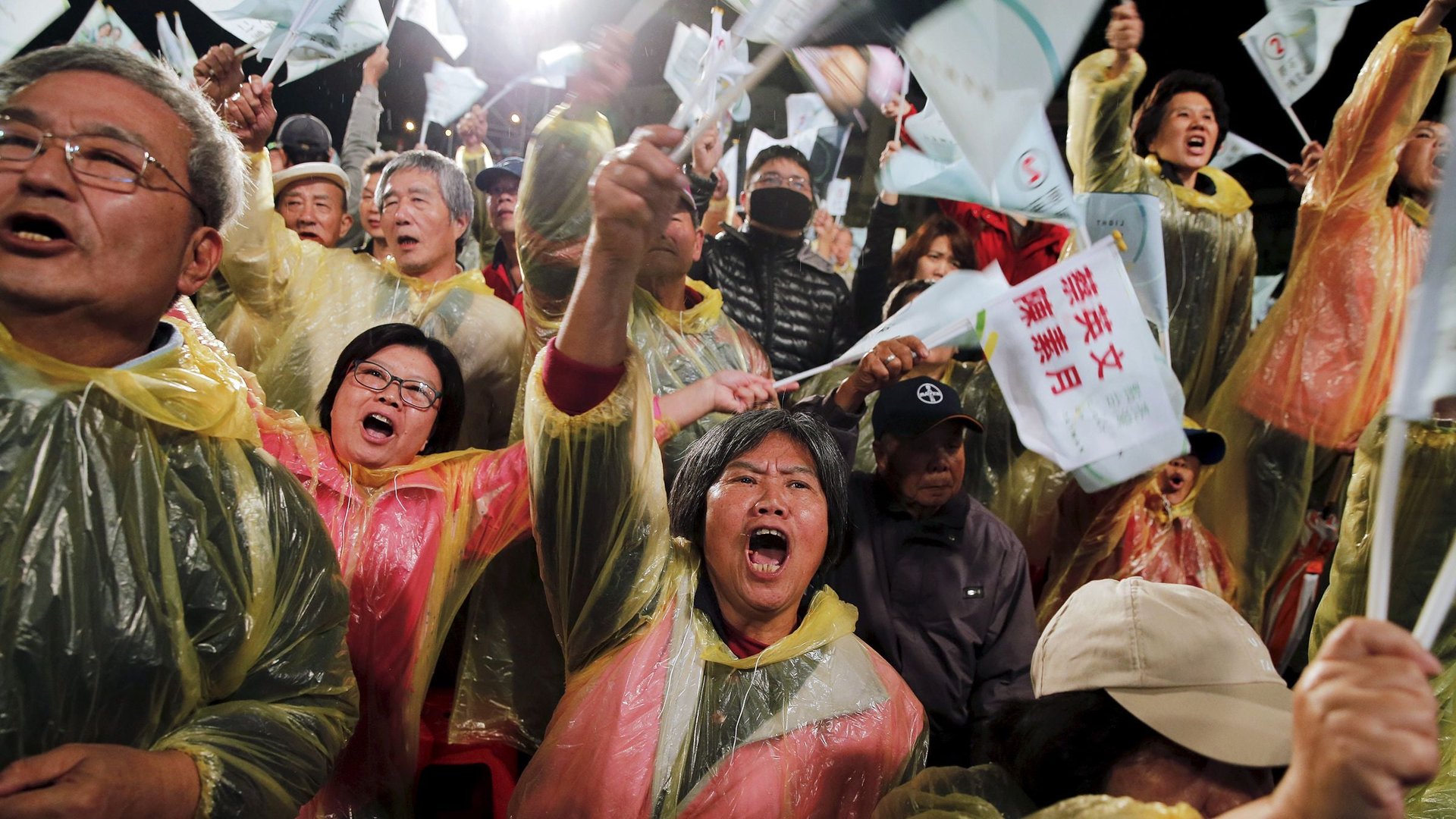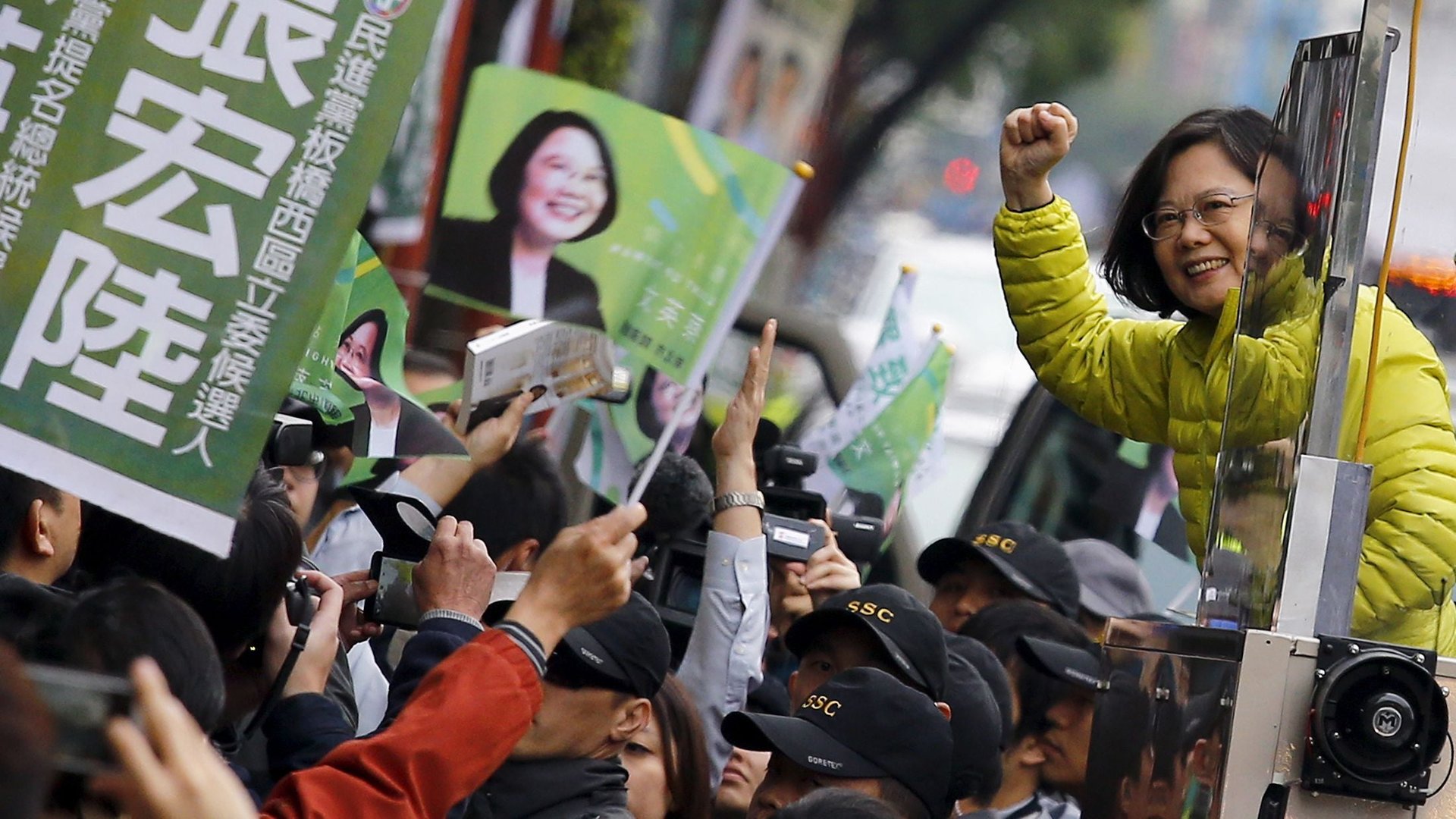Taiwan’s elections are here and China is the last thing voters care about
This Saturday (Jan. 16), Taiwan will go to the polls to elect legislative leaders and a brand-new president. National elections in Taiwan have long been framed in terms of each side’s views on China: Is a party or candidate pro-China, or pro-Taiwan independence?


This Saturday (Jan. 16), Taiwan will go to the polls to elect legislative leaders and a brand-new president. National elections in Taiwan have long been framed in terms of each side’s views on China: Is a party or candidate pro-China, or pro-Taiwan independence?
That’s not the case this year. Indeed, the leading candidate—Tsai Ing-wen of the opposition Democratic Progressive Party (DPP)—has gotten ahead by setting relations with China largely to the side.
It’s easy to think that Taiwan’s elections would be all about China. Beijing goes to great lengths to treat the small, democratic island—which it views as a renegade province—as part of its territory, for example by forcing it to be called “Chinese Taipei” in international events, including beauty pageants. China (excluding Hong Kong) accounts for a quarter of Taiwan’s exports. And in some ways, the two have never been closer, with unprecedented levels of mutual trade, tourism, and employment.
But Taiwan’s big, scary neighbor is the last thing on voter’s minds, as domestic issues take center stage and fewer people than ever see themselves as part of mainland China.
That James Carville quote again
Far and away the biggest domestic issue is the economy: 41% of respondents to a survey (link in Chinese) by Taiwan’s CommonWealth Magazine said that “poor economic performance” posed the biggest risk to Taiwanese society, while only 8.3% thought that relations with China posed a major risk.
The economic anxiety is driven by a bunch of factors. GDP growth is slowing. In real terms, wages have barely moved in the past decade. Many feel that Taiwan is falling behind competitors, particularly South Korea, when it comes to creating successful global brands making quality final products.
Not even the economy is all about China
Of course, China looms over the economic discussion. It is Taiwan’s largest trade partner by far, and any plan to improve economic performance has to have some strategy for dealing with Beijing. But this election round, both major parties—including the Kuomintang (KMT), which traditionally favors closer ties with China—agree that the Taiwanese economy has become too dependent on China, and needs to diversify.
This follows eight years of KMT rule under president Ma Ying-jeou, which has been defined by increasing economic integration with China. The promise from Ma and Beijing was that integration would lead to prosperity. That has not happened. If anything, the feeling in Taiwan is that closer ties have allowed China to become a more legitimate competitor in industries like semiconductor manufacturing, once dominated by Taiwan.
That dynamic has had a couple of effects. First, it leaves Beijing uncertain as to what exactly it can offer Taiwan, because the argument that economic integration with China is the best thing for everyone is a lot less convincing. If buddying up to China is not great for the economy, its only real consequence, from Taiwan’s point of view, is an increased threat of Chinese involvement in domestic politics and industry. Those are the very worries that in 2014 spurred students to occupy Taiwan’s legislature in what has been called the “Sunflower Movement.”

The failure of integration could also loosen China’s grip on the Taiwanese economy. Beijing has long done its best to block Taiwan from signing free trade agreements with other countries. With the economic reason for ties with China fading, however, this strategy may come at too great a cost, threatening to completely alienate Taiwan by severely limiting its economic choices.
That means there is more weight to the argument in Taiwan that it makes economic sense to not be dependent on a single country, which is why the DPP is discussing trade liberalization with the US, Southeast Asia, and others. Tsai has taken this so far as to relax her position against ractopamine, a growth drug used in American pork. Taiwan’s ban of the drug has not gone down well with American trade negotiators, and is seen as a blocker to further free-trade discussions.
Tsai wants to try to move away from the export-led growth that for decades propelled Taiwan ahead in the per-capita income charts, but appears to have run its course. What will replace this? She and her fellow candidates want to encourage more entrepreneurship and risk-taking, and provide better access to venture capital. The plans are full of buzzwords like “innovation” and “creative.” The point is, though, not one of those buzzwords is “China.”
Identity politics
It’s not all about the economy. There will be a host of other domestic issues to contend with, like economic inequality and corruption. There is a lot of talk of education reform. CommonWealth’s survey also asked people which issues they felt politicians should “improve immediately,” and none of the top responses have anything to do with China.
The domestic focus points to a more fundamental shift: the rise of a younger generation that sees China as just another country. Surveys conducted regularly by Taipei’s National Chengchi University show that the number of people in Taiwan who identify as “Chinese” or “Chinese and Taiwanese” is falling while simply “Taiwanese” rises to domination.
What was first felt in the Sunflower Movement’s occupation of the legislature has grown into the “third force” in Taiwanese politics—a group of small parties that are challenging the duopoly of the DPP and KMT. These groups shun politics-via-China, fighting for causes that very consciously have nothing to do with China and even go against “Chinese culture.” Take, for example, advocating for indigenous land rights or greater use of the Taiwanese language, which is distinct from Mandarin and has been widely spoken in Taiwan for hundreds of years. (A prominent candidate for the New Power Party is a death metal singer who often writes in Taiwanese.)
The strength of this younger generation, which normally supports the DPP’s more progressive agenda, may even propel that party to its first-ever legislative majority.
China, of course, won’t go away. Xi Jinping, China’s president, has taken a firmer stance on Taiwan than his predecessors. Even with irreverence from Taiwan, he can try to deter countries from signing trade agreements with Taiwan, or threaten the huge number of Taiwanese businesspeople who operate in the mainland. Xi’s recent meeting with Ma suggests he may have a more diplomatic side, and Tsai will have to appeal to it. While voters aren’t really concerned what’s happening with China, Tsai will have to be when she gets elected.
It has been over 60 years since Chiang Kai-shek’s KMT fled mainland China, as it lost a civil war to the communists, and established a government-in-exile in Taiwan. Chiang’s dream of recapturing the mainland is not only militarily impossible now, there are simply not many people in Taiwan who really care about doing it. Those who do are starting to look as crazy as someone in England who thinks the UK should try to restore the British Empire.
That doesn’t mean Taiwan has lost hope for the future. It’s just that many hope the future isn’t all about China.